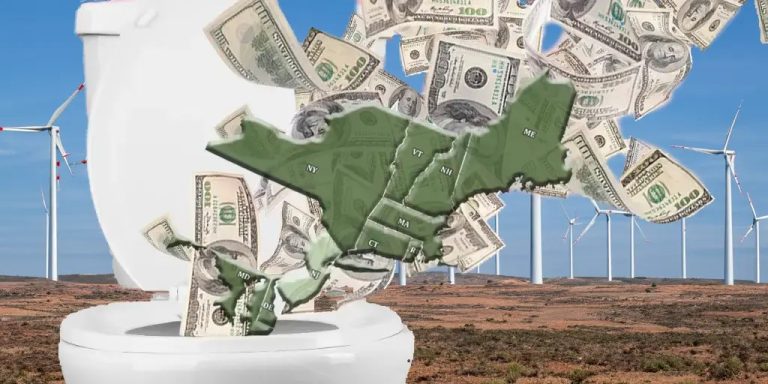Steve Harner
Grapevines can absorb carbon dioxide, so climate alarmist activists in Virginia had no compunction to pull the cork today after learning that a Virginia circuit court judge will order Virginia to rejoin the Regional Greenhouse Gas Initiative (RGGI).
During Virginia's three-year participation in a multistate cap-and-tax agreement, Virginia collected $828 million from electricity producers seeking permits to emit carbon dioxide emissions. Dominion Energy Virginia, the state's largest payer, simply passes the cost on to consumers dollar for dollar on their monthly bills.
The judge's final order has not yet been issued, so the details of any relief he will order have yet to be determined. But on Monday, Floyd County Judge C. Randall Lowe circulated an opinion saying he agreed with RGGI's supporters that, under his interpretation of the 2020 legislation, only the Virginia General Assembly could allow the state to withdraw The contract.
Republican Gov. Glenn Youngkin and Republican Attorney General Jason Miares have taken the position that the regulation is permissive but not mandatory. The two issued brief statements today disagreeing with the judge's order and pledging to appeal to the Virginia Supreme Court. Presumably, they will also ask a higher court to stay the order, but that motion may be denied.
The case occurred in rural Floyd County because it is home to an association of energy efficiency renovation contractors and one of the only plaintiffs in the case to gain standing.
Whoever wins in circuit court is always likely to face an appeal. Indeed, the real decision on RGGI’s future in Virginia will depend on the 2025 election, the next governor and the future General Assembly. If this ruling stands, and Virginia is in RGGI when a new governor takes office, only a three-game Republican victory streak could overturn it again.
Exiting RGGI was a promise the Governor made when he took office in 2021, but it took two years to materialize. At the Governor's urging, the Air Pollution Control Board voted in the summer of 2023 to withdraw from RGGI when the current contract ends in December 2023.
The judge said the board's vote to annul was invalid, illegal and void. This provision remains in effect. This means that it is illegal for the state government not to force its generators to purchase and use this year's RGGI points. He asked attorneys for the plaintiffs in the case to draft a final order outlining what will happen next. Does this include some compensation for RGGI's lost revenue in 2024, which could be around $400-500 million?
why not? The case was brought by a group of energy conservation contractors who were paid to renovate homes to make them more energy efficient. They believed (correctly) that the decision to withdraw from RGGI ended their meal vouchers and would reduce their activity and income. Monetary damages are the harm they have suffered and money is an inevitable part of any relief. RGGI is not the only source of revenue for their project, but that doesn't seem to matter. A judge ruled they were illegally deprived of the money.
On the other side of RGGI's books, localities and contractors working to prevent or mitigate flooding also lost jobs and money. They receive the other half of the RGGI levy collected between 2021 and 2023.
The RGGI agreement between states is on a three-year cycle, and Virginia missed the start of the 2024-2026 contract period. Other RGGI states will have a say in whether, when, and under what conditions Virginia rejoins the Union. Virginia's return would also have an impact on allowance prices and carbon taxes.
RGGI has been a political swing figure in Virginia for the better part of a decade. Governor Terry McAuliffe began the process by asking his aviation commission to implement RGGI membership regulations. The General Assembly took no action to order Virginia to join RGGI. Instead, then-Republican lawmakers passed legislation that required legislative approval, only to have it vetoed by the Democratic governor. But Republicans were able to block RGGI by refusing to fund its implementation.
The game turned when Democrats took control of Virginia in three straight states in 2020. The 2020 legislation also provides for the use of RGGI funds for weatherization and flood protection, creating a strong constituency for maintaining revenue streams. There will soon be a flood of revenue.
It is reported Bacon's Rebellion It comes after the price per ton of carbon emissions rose sharply in the months since Virginia withdrew from the agreement. The final 2024 auction in early December could set a new record.
In 2023, Dominion charges every customer (residential and business) the same $4.43 per 1,000 kilowatt-hours. A good guess is that if the tax continues on 2024 bills, it will rise to at least $5 per 1,000 kWh or more this year. Dominion uses a 1,000 kilowatt-hour example as a “typical” electricity bill, but many residential customers use far more than that each month, so the bill will increase by much more than $5-6. Often, these large bills go to fairly small homes with poor insulation and a poor heating system.
As for what the tax will be in 2025, given the rise in carbon prices at the auction, maybe Dominion has an estimate if it's willing to share it. Can it reach US$7-8 per 1,000 kWh? In Virginia’s first auction of 2021, carbon tax was $7.60 per ton, in recent auction – less than four years later – up 240% to $25.75 per ton.
None of the price forecasts in Dominion's most recent integrated resource plan assume an RGGI carbon tax on its hydrocarbon generation fleet over the next 15 years. For the purposes of this IRP, it will be its grow Whereas the plan adds 6 GW of gas-fired power generation to the hydrocarbon generation fleet.
There is an old saying in Richmond: “A statute means what the judge says it means.” The first to speak may be several judges.
Relevant
